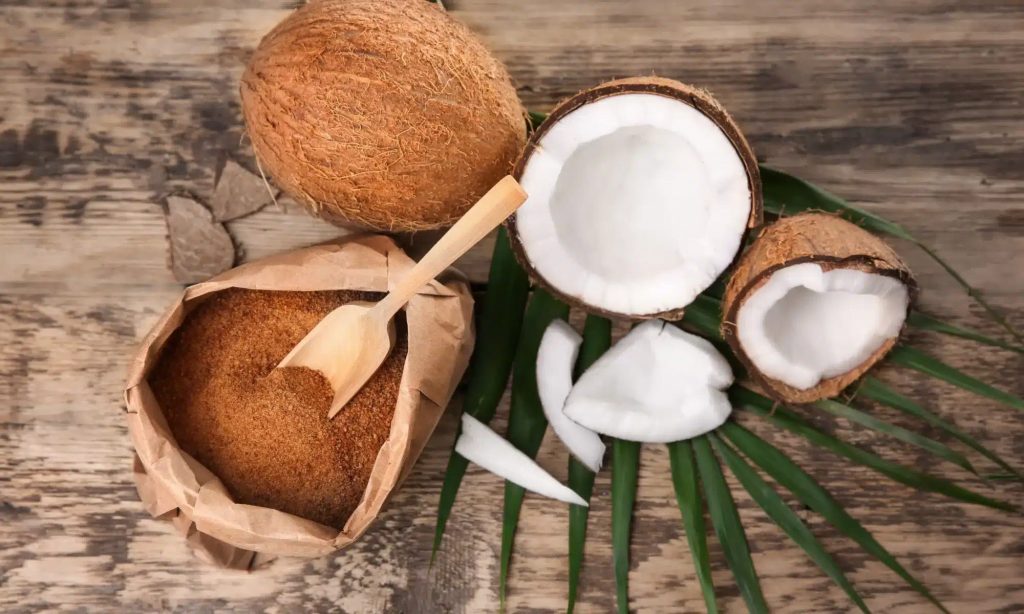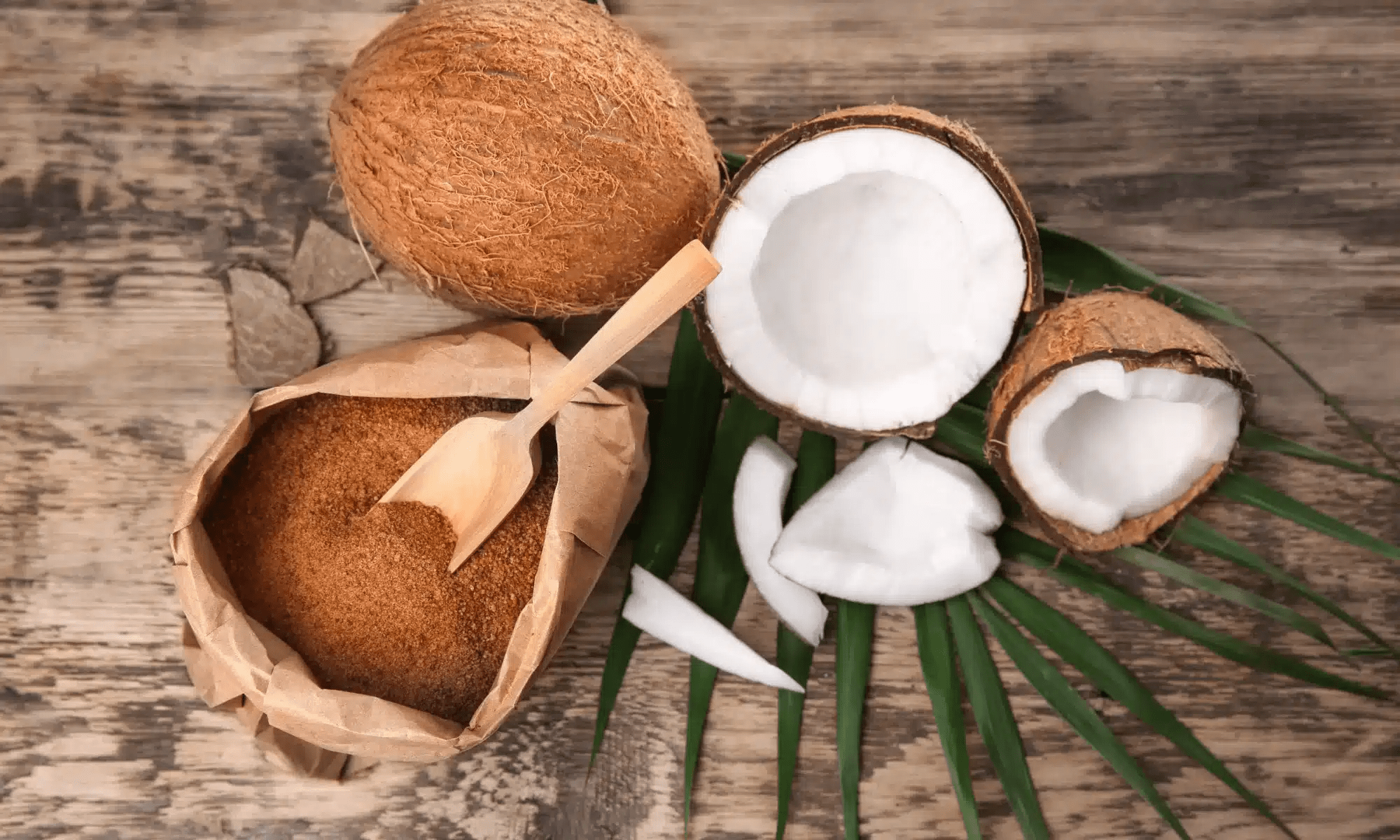
Coconut Sugar: Anti-Inflammatory, Heart-Protective,
Nutrient-Filled Benefits
When it comes to healthy natural sugars, coconut sugar often comes to mind for many people. It boasts numerous health benefits not widely known.
By Flora Zhao 10/6/2023
When it comes to healthy natural sugars, many people think of coconut sugar. Some might assume because of its name that coconut sugar is extracted from coconut fruit. However, to be precise, this type of sugar is called “coconut blossom sugar,” as it’s derived from sap that flows from the coconut tree’s inflorescences, which are clusters of flowers on a stem. Coconut sugar boasts numerous health benefits not widely known.
How Is Coconut Sugar Produced?
To obtain coconut sugar, coconut farmers usually climb coconut trees twice a day. During this process, they adeptly employ knives to cut into the unopened inflorescences of the coconut trees, collecting the sap that flows from them. The sap is then boiled, concentrated, and processed into sugar syrup, blocks, or granules.
The main producers of coconut sugar are Southeast Asian countries, such as the Philippines, Indonesia, and Thailand.
Coconut farmers cut open the unopened inflorescences of coconut trees, collecting the sap that flows from them.
A single inflorescence from a coconut tree can yield 1.5 liters of sap each day, which contains 15 percent sugar, enough to produce 200 grams of coconut sugar. On average, a coconut tree grows a new inflorescence each month, and each can be tapped for sap for more than 40 consecutive days. This harvesting cycle of coconut trees can extend up to 20 years.
Low Glycemic Index of Coconut Sugar
In general, foods with a glycemic index (GI) of 55 or lower are classified as low-GI foods, as they result in a gradual change in blood sugar levels after consumption. Foods with a GI value between 56 and 69 are classified as medium-GI foods, and foods with a value of 70 or higher are considered high-GI foods.
Various sources indicate that the GI of coconut sugar falls between 35 and 54, similar to that of maple syrup and lower than that of honey, which has a GI value of 60 (pdf).
The GI of coconut sugar is lower because of its sugar composition.
Coconut sugar made from fresh coconut sap without preservatives is made up of about 49 percent sucrose, 16 percent glucose, and 14 percent fructose. However, if preservative lime is added during the sap collection process, it will break down a smaller amount of sucrose into glucose and fructose. As a result, the produced coconut sugar will contain a higher sucrose level.
Coconut sugar also contains a certain amount of inulin, approximately 4.7 grams per 100 grams. Inulin is a type of dietary fiber that can help slow the rise of blood sugar.
The Health Benefits of Coconut Sugar
Heart-Healthy Anti-Inflammatory and Antioxidant
The process of boiling coconut sap involves a Maillard reaction, an interaction of sugars, amino acids, and other macromolecules. The products of the Maillard reaction contribute to the nutritional value and sensory enjoyment of coconut sugar. However, the effects of the Maillard reaction are intricate and heterogeneous and can result in advanced glycation end products, which are something that should generally be avoided. But some of these substances also possess antioxidant and anti-inflammatory activities.
American scientists conducted a small-scale pilot study employing a double-blind, randomized, placebo-controlled design published in the Journal of Applied Physiology. The study demonstrated the potential cardioprotective effect of coconut sugar on middle-aged and older adults.
Nineteen adults around the age of 55 participated in the experiment. One group of participants consumed 1.5 grams of coconut sugar daily, and the other received a placebo. After eight weeks, the participants who consumed coconut sugar experienced a reduction in systolic blood pressure from 117 to 109 mmHg. The consumption of coconut sugar was associated with an improvement in arterial stiffness among participants.
Anti-Diabetic
One of the factors leading to Type 2 diabetes is oxidative stress, which can induce insulin resistance and impair insulin secretion. Coconut sugar contains high levels of polyphenols, which can reduce oxidative stress.
“Research has confirmed that there are five main phenolic compounds, such as gallic acid, protocatechuic acid, caffeic acid, p-coumaric acid, and alanine in coconut sap. These will be in coconut sugar, but the amount will definitely change (increased in this case) due to longer processing time and higher processing temperature,” Yus Aniza Yusof, from the Department of Process and Food Engineering at the Faculty of Engineering, Universiti Putra Malaysia, told The Epoch Times.
Experiments have demonstrated that coconut sugar possesses a certain inhibitory effect on alpha-amylase. A study published in the International Journal of PharmTech Research in 2015 suggested that coconut sugar could be used to treat Type 2 diabetes.
Coconut sugar also contains amino acids such as leucine, arginine, and isoleucine, which may have anti-diabetic properties.
In a study published in Foods in 2022, researchers fed diabetic rats cookies made from various raw materials. The results show that, compared with cookies containing added sucrose and margarine, rats that consumed corn cookies made with coconut sugar and coconut oil experienced a significant reduction in blood sugar levels and oxidative stress. Notably, their previously low hemoglobin levels and body weight also improved. After maintaining this diet for four weeks, the blood sugar indicators of the diabetic rats improved, and their overall condition became comparable to that of normal rats.
Retains More Nutrients Than Refined Sugar
Ms. Yusof mentioned that coconut sap contains 0.27 percent ash, which represents the content of minerals and trace metals such as calcium, magnesium, manganese, copper, sodium, potassium, zinc, and iron.
“As the minerals are more stable and don’t destroy even by burning, hence they are present in coconut sugar too,” she explained.
The iron, magnesium, and zinc content in coconut sugar is twice, four times, and 10 times higher than in cane sugar, respectively. Coconut sugar also contains more phosphorus and potassium.
According to Ms. Yusof, although the quantities of these substances in coconut sugar aren’t substantial, consuming coconut sugar can, to some extent, provide the body with minerals and trace metals.
Coconut sugar contains the amino acids required for protein synthesis, and it’s also a rich source of vitamins B1, B2, B3, and B6.
Consume Coconut Sugar in Moderation
Coconut sugar contains 16 calories per teaspoon, the same as regular sugar. Although coconut sugar has some nutritional components, the quantities are relatively limited. Excessive consumption can offset the benefits because of the overall intake of sugars.
German researchers conducted a sensory evaluation of various coconut sugars, and interestingly, coconut sugar was described as having neither the aroma nor the taste of coconut.
The more affordable coconut sugars tend to have a darker color and coarser granules and are primarily characterized by their sweetness.
On the other hand, the more expensive coconut sugars tend to be light brown, have a finer texture, and exhibit higher fluidity. They were described as having a combination of sweet, caramel, malt, and roasted flavors.

